Overview
The article titled "10 Startup Labor Trends for 2025 Every Sales Leader Should Know" emphasizes critical labor trends that are shaping the startup landscape in 2025. It addresses essential themes such as:
- The significance of remote work
- The necessity for diversity and inclusion
- The demand for flexible work arrangements
- The rise of technology and automation
Understanding these trends is vital for sales leaders aiming to attract top talent and improve operational efficiency in an increasingly competitive job market.
Introduction
The landscape of startup labor is undergoing a rapid transformation, with 2025 set to usher in significant changes that every sales leader must comprehend. The integration of AI in recruitment, the rise of remote work, and a heightened focus on diversity are not just trends; they are pivotal factors that present both opportunities and challenges for emerging businesses.
How can leaders effectively navigate this evolving terrain to attract top talent and cultivate a thriving workplace culture? By delving into the latest labor trends, we can uncover actionable insights that empower startups to achieve sustained success in an increasingly competitive environment.
Websets: AI-Powered Solutions for Optimizing Recruitment in Startups
revolutionizes the recruitment process for emerging companies through [advanced AI algorithms](https://docs.exa.ai/websets/api/overview). Its powerful search engine adeptly filters vast datasets, allowing companies to quickly identify and connect with qualified candidates. By enriching search results with in-depth insights, such as LinkedIn profiles and prior work experiences, Websets empowers new businesses to make informed hiring decisions.
In today's competitive job market, where attracting top talent is vital for sustained growth and success, this efficiency becomes indispensable. Notably, 67% of organizations report enhanced hiring forecast precision following the adoption of AI. This platform not only optimizes recruitment efforts for emerging companies but also boosts their overall operational efficiency.
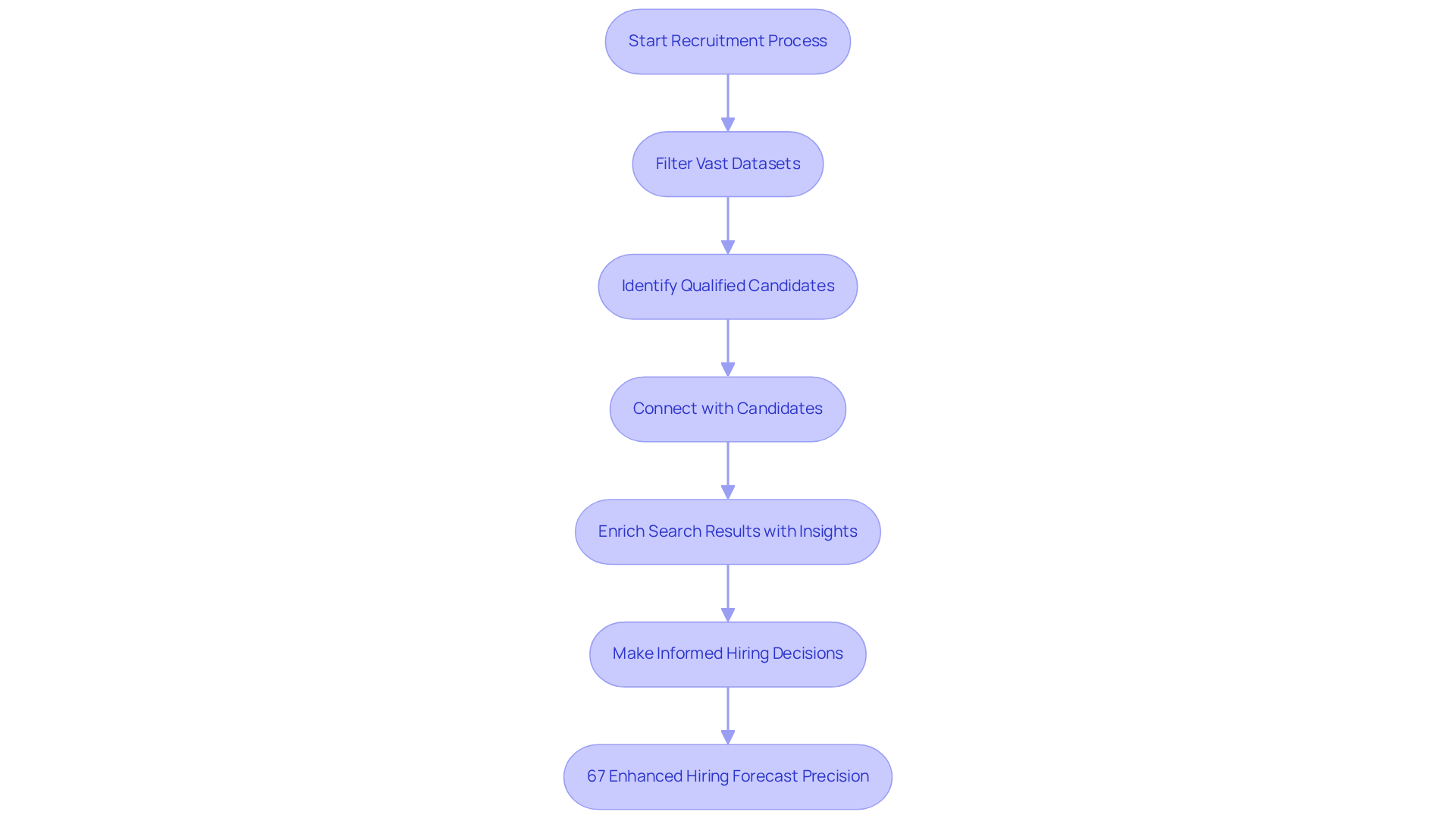
Remote Work: Transforming Startup Labor Dynamics
The emergence of remote work has fundamentally transformed labor dynamics within new enterprises, reflecting the startup labor trends 2025. This shift enables access to a global talent pool, enhancing diversity and fostering innovation. With this broader hiring landscape, startups can attract varied perspectives, leading to more creative solutions and improved problem-solving capabilities. However, significant challenges arise in maintaining team cohesion and ensuring effective communication across dispersed teams, especially in light of startup labor trends 2025.
To tackle these challenges, sales executives must utilize precision-driven B2B lead generation and recruitment solutions that emphasize sourcing candidates with unique qualities. By leveraging advanced AI-driven recruitment strategies, executives can identify and engage with candidates who possess hard-to-describe attributes that align with their organizational needs. Furthermore, cultivating a remote-friendly culture that emphasizes collaboration and productivity is essential.
This involves utilizing advanced digital tools for seamless communication and establishing clear expectations to guide group members. Nurturing an atmosphere of trust and accountability is vital. By implementing regular updates and virtual collaborative exercises, leaders can enhance engagement, ensuring that all members feel valued and connected. Ultimately, these by adapting to startup labor trends 2025 in a remote work environment.
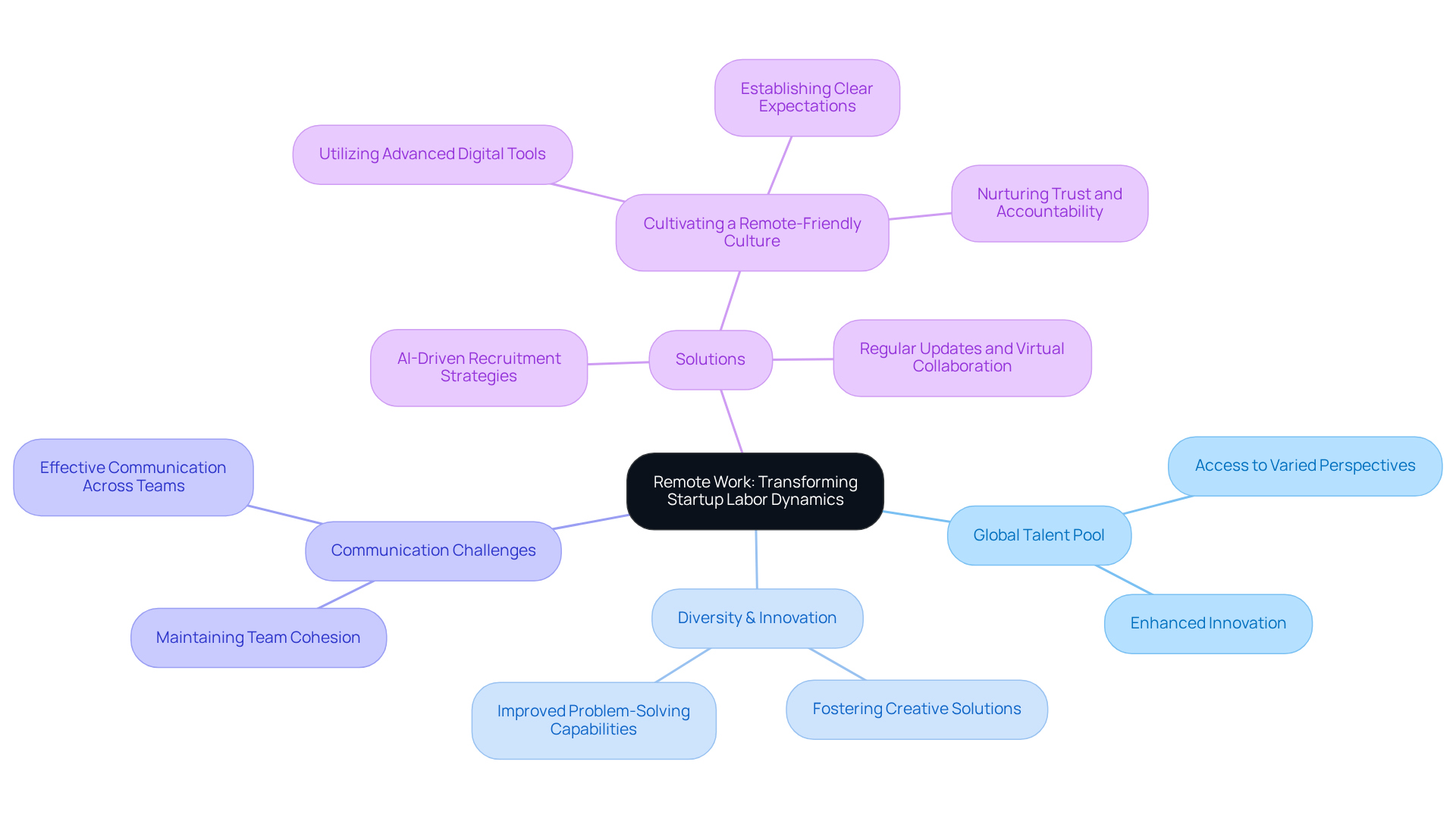
Diversity and Inclusion: Key Focus Areas for Startup Hiring
Diversity and inclusion are essential components of effective hiring strategies for emerging businesses. Companies that prioritize diverse hiring not only foster a dynamic workplace culture but also significantly boost their potential for innovation and creativity. Research shows that diverse teams excel in problem-solving, achieving a 60% improvement in decision-making outcomes compared to less diverse groups. A Cloverpop study highlights that diverse teams outperform individuals 87% of the time in decision-making. Furthermore, businesses with diverse workforces are 36% more likely to achieve financial success, with firms in the top quartile for racial and ethnic diversity being 36% more likely to attain superior financial returns, according to McKinsey findings.
Sales leaders must implement inclusive hiring practices, such as:
- Blind recruitment
- Diverse interview panels
to attract a wide range of candidates. These strategies not only help mitigate unconscious bias but also ensure that every voice is valued and heard. As Sundar Pichai, CEO of Google, states, 'A diverse mix of voices leads to better discussions, decisions, and outcomes for everyone.' By cultivating an environment where diverse perspectives are embraced, new ventures can more effectively adapt to rapidly changing market conditions and drive sustained growth. Embracing diversity is not merely a moral obligation; it is a strategic advantage that propels new ventures toward greater success. Moreover, with 76% of job seekers considering a diverse workforce a crucial factor when evaluating companies, prioritizing diversity can significantly enhance an organization's ability to attract top talent.
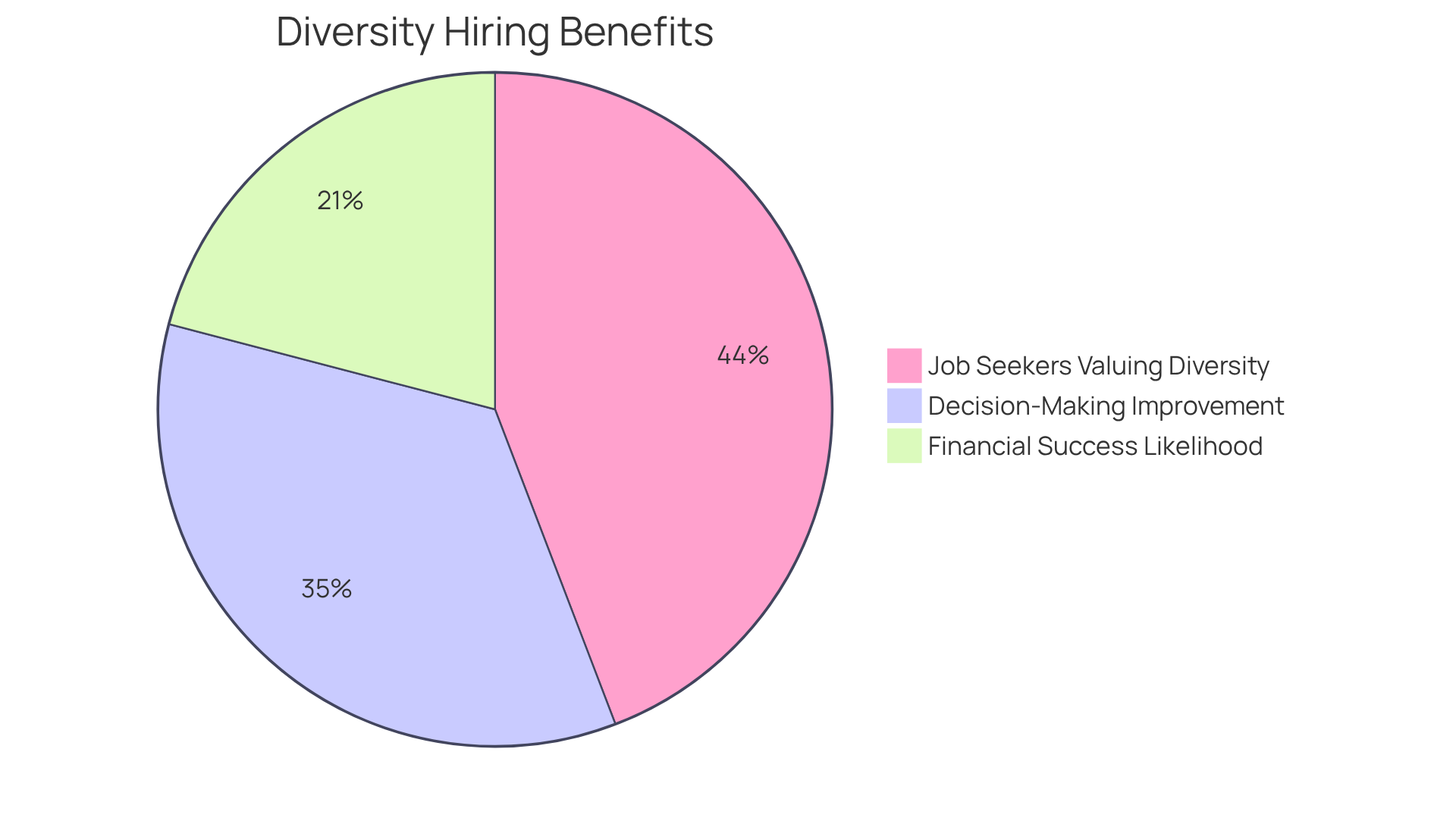
Gig Economy: Shaping Talent Acquisition Strategies for Startups
The gig economy is revolutionizing talent acquisition strategies for new enterprises, aligning with startup labor trends 2025 by providing access to a flexible workforce capable of adapting to fluctuating demands. By employing gig workers, businesses can significantly reduce overhead costs while maintaining operational agility. This strategy allows companies to without the long-term commitments tied to full-time hires. Sales leaders must consider the integration of gig workers into their teams to boost productivity and effectively address project-specific needs.
How can your organization leverage this trend to enhance efficiency and competitiveness?
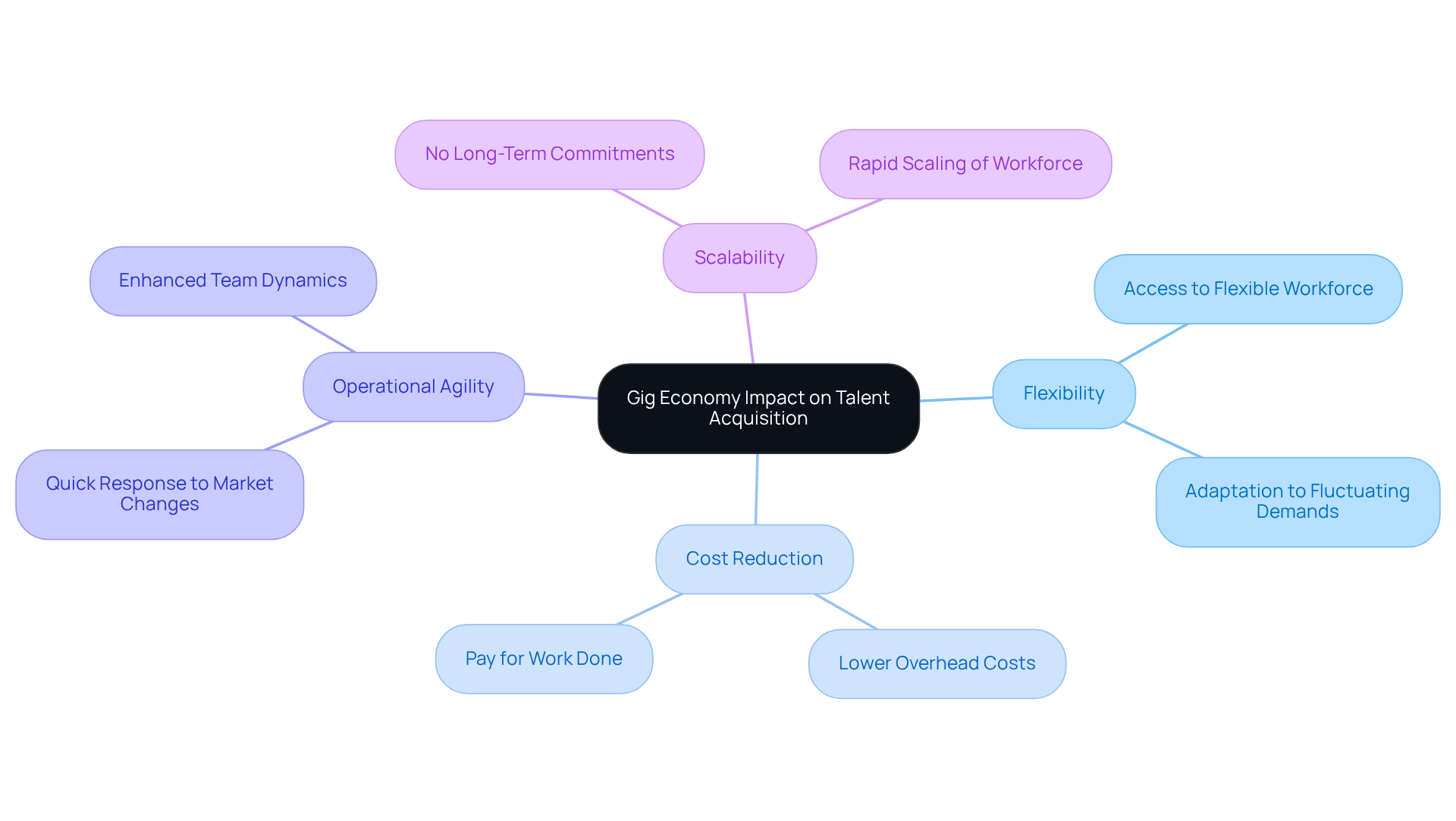
Automation and AI: Enhancing Efficiency in Startup Workforces
Automation and AI are pivotal for boosting efficiency within emerging company workforces, especially when leveraging advanced solutions like Websets. By automating repetitive tasks, new companies can liberate valuable time for employees to concentrate on strategic initiatives. Websets' AI-driven tools, including the Research Agentic API and Exa's AI Answers, not only optimize operations but also analyze data to provide insights that enhance decision-making. This capability empowers sales teams to refine their strategies and elevate performance, particularly through Websets' unique search functionalities tailored for complex queries.
Investing in technology that fosters automation, such as Websets, is essential for new businesses striving to enhance productivity and sustain a competitive edge in the marketplace. As Ginni Rometty, former CEO of IBM, emphasized, this technology is about augmenting human intelligence, enabling teams to achieve superior outcomes. Moreover, businesses that neglect to integrate AI risk lagging behind, as AI is swiftly becoming a standard expectation in products and services. With over 70% of users reporting , the potential for new businesses to enhance productivity through tools like Websets is substantial.
Additionally, Websets guarantees compliance and security with its robust framework, establishing it as a reliable choice for enterprise customers. The time to act is now—embrace automation and AI to not only keep pace but to lead in your industry.
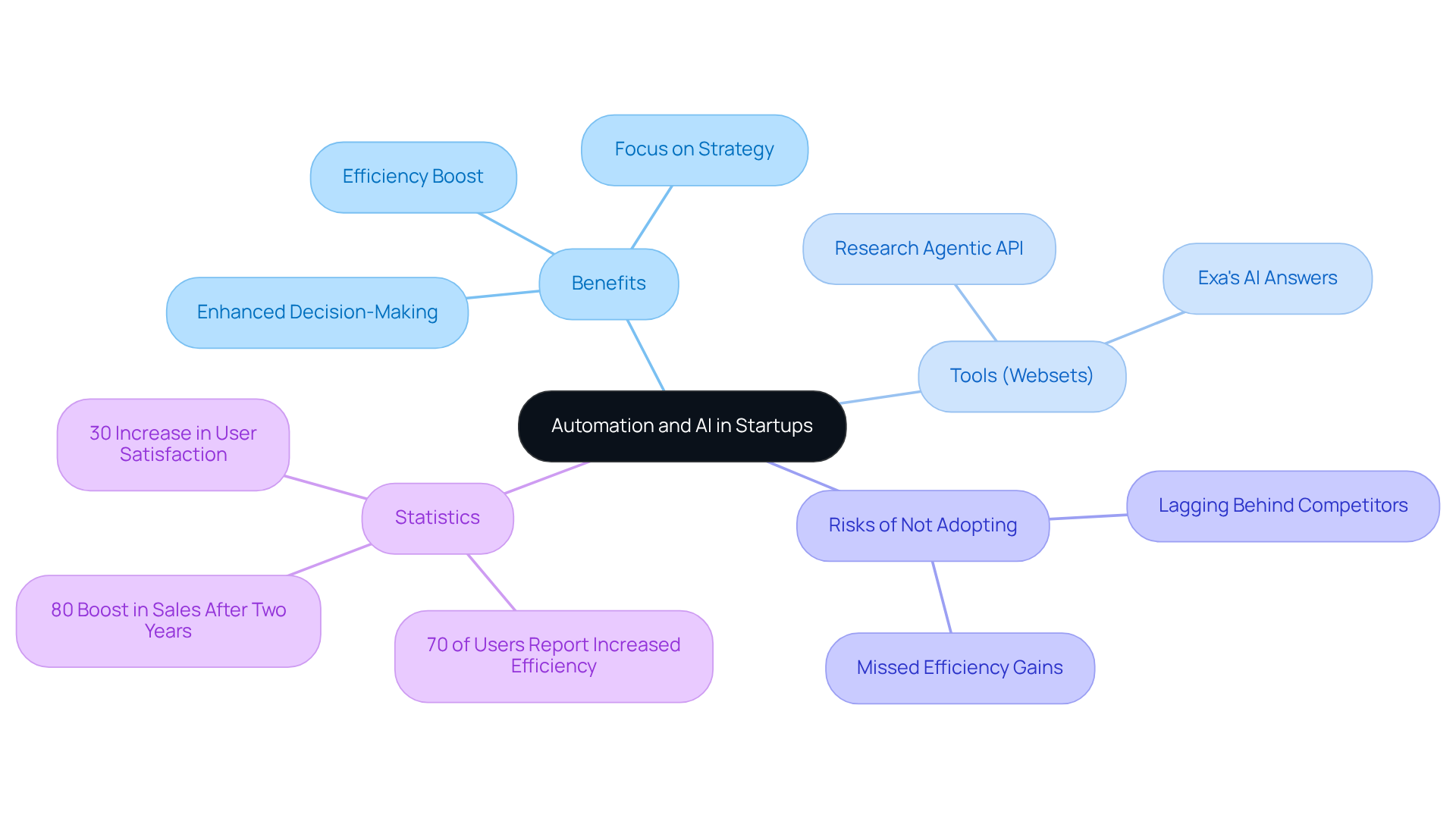
Employee Well-Being: A Priority for Startup Labor Trends
Employee well-being is not just a trend; it is a fundamental priority in the context of startup labor trends 2025. Organizations that strategically invest in well-being initiatives—such as mental health support and flexible work arrangements—experience significantly higher levels of staff satisfaction and productivity.
Sales leaders must champion a culture that prioritizes well-being, as engaged and content employees are inherently more driven to achieve their goals.
Implementing comprehensive wellness programs not only reduces turnover but also cultivates a more resilient workforce. This is not merely beneficial; it is .
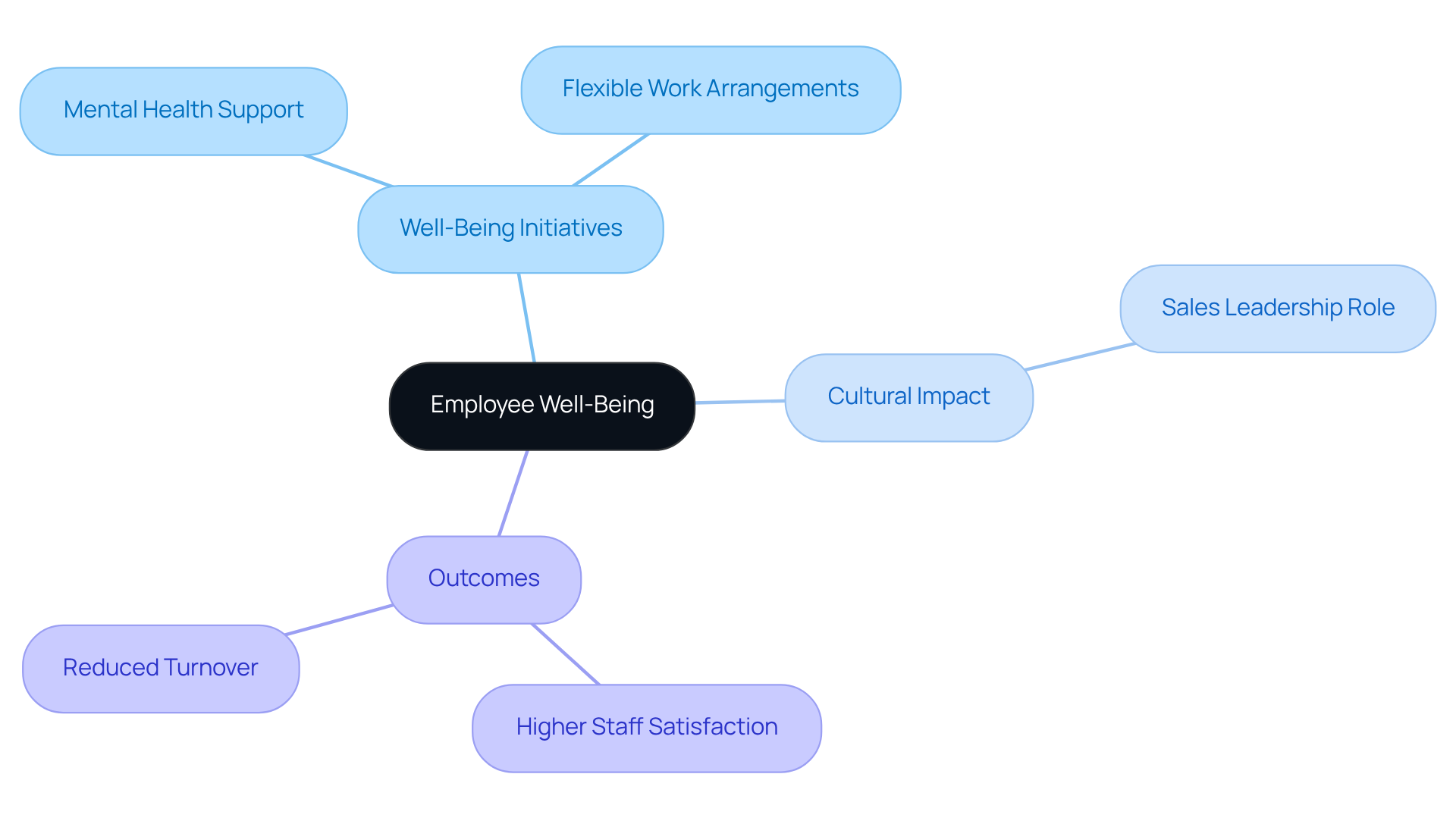
Upskilling and Continuous Learning: Essential for Startup Success
In today's rapidly evolving business landscape, upskilling and continuous learning are vital for startup success, particularly in light of startup labor trends 2025. As technology and market demands shift, it becomes essential for workers to possess the latest skills to maintain a competitive edge. Sales leaders are pivotal in nurturing a culture of learning by facilitating access to diverse training programs and resources that encourage professional development. This strategic investment not only enhances worker capabilities but also propels overall business growth and innovation.
Research indicates that companies with extensive training programs experience an astounding 218% higher income per staff member compared to those lacking structured training. Furthermore, 94% of staff express a desire to remain longer at organizations that invest in their career development, underscoring the critical role of ongoing learning in staff retention. Additionally, companies witness a 17% increase in productivity when employees receive the necessary training, highlighting the direct impact of training on business success.
Successful training initiatives, such as the , exemplify the efficacy of structured coaching and mentorship in enhancing leadership skills and fostering collaboration. By the conclusion of its first year, MediaMonks anticipates certifying over 300 managers, which is expected to enhance creativity and collaboration across its global workforce. By prioritizing continuous learning and integrating mobile learning strategies—proven to boost retention rates by 45% over traditional methods—startups can adapt to startup labor trends 2025, cultivating a more adaptable workforce and ultimately positioning themselves for sustained success in a competitive market.
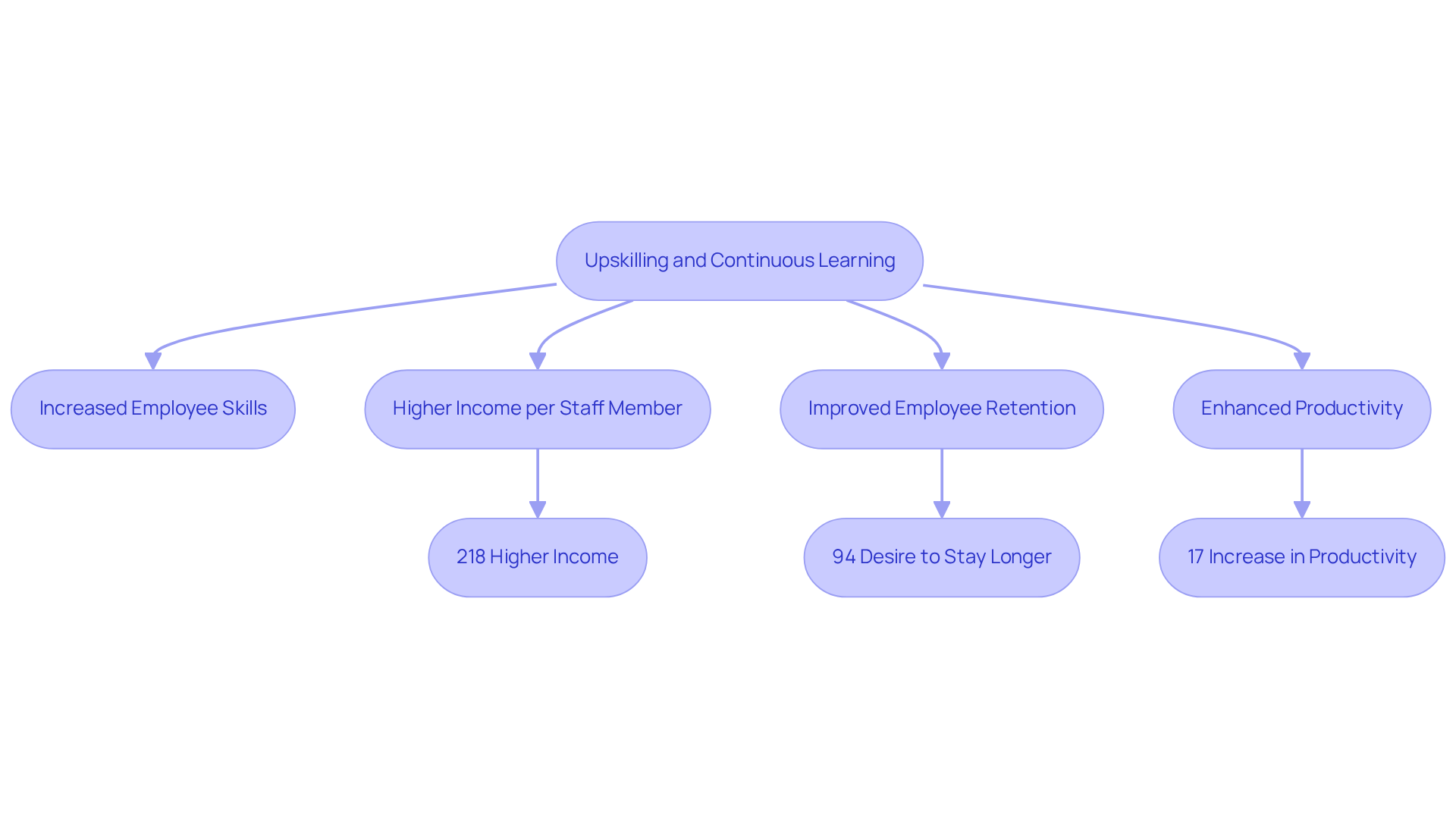
Flexible Work Arrangements: Attracting Talent in Startups
Flexible work arrangements are increasingly essential for attracting talent to new businesses, in line with the startup labor trends 2025. Today’s candidates prioritize and actively seek opportunities that align with startup labor trends 2025, which include remote work and adaptable schedules. By providing such arrangements, startups can distinguish themselves in a competitive job market, appealing to a broader range of candidates in line with startup labor trends 2025. Sales leaders must advocate for policies that promote flexibility, as this can lead to enhanced staff satisfaction and improved retention rates.
Consider initiatives like Flex @Marsh, launched in 2021, which empower employees to collaboratively shape their working conditions. This approach fosters enhanced diversity, productivity, and efficiency within the organization. By promoting a culture of flexibility, staff feel valued and supported, directly contributing to higher job satisfaction. Notably, since the introduction of Flex @Marsh, requests for flexible working arrangements have surged, highlighting the growing demand for such policies.
Research indicates that companies that prioritize work-life balance will be aligned with startup labor trends 2025 and enjoy higher staff retention rates. By adopting flexible policies, new ventures can cultivate an environment that reflects startup labor trends 2025, resulting in higher employee engagement and commitment. As Nick Harris, CEO of Marsh Pacific, aptly states, "Being a family-inclusive organization means that our people don’t have to make a choice between showing up for their job, or showing up for their family." This dedication to flexibility not only attracts top talent but also fosters a loyal workforce, ultimately enhancing performance and outcomes for the organization. Furthermore, the updated Parental Leave Policy at Marsh, which offers gender-neutral entitlements for both parents, exemplifies the company's commitment to supporting work-life balance.
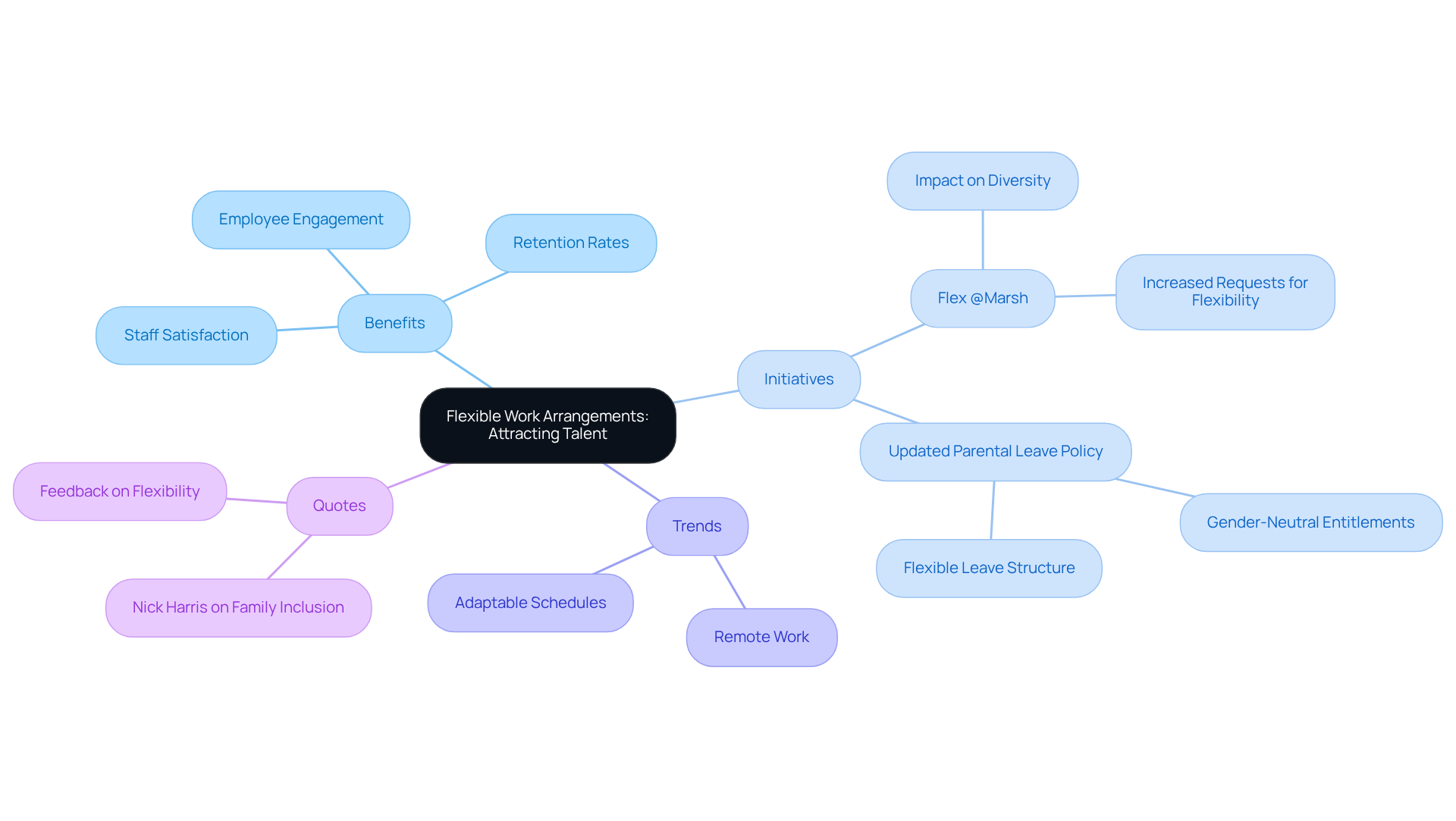
Sustainability and Corporate Responsibility: Influencing Startup Labor Practices
Sustainability and corporate responsibility are increasingly pivotal in shaping labor practices within emerging businesses. Companies that prioritize ethical labor practices and sustainability initiatives not only bolster their brand reputation but also attract talent that values social responsibility.
Sales leaders must consider how their organizations can into their operations and recruitment strategies. This alignment resonates with both staff and customers, fostering loyalty and engagement. By embracing these principles, businesses can position themselves as leaders in a socially conscious marketplace.
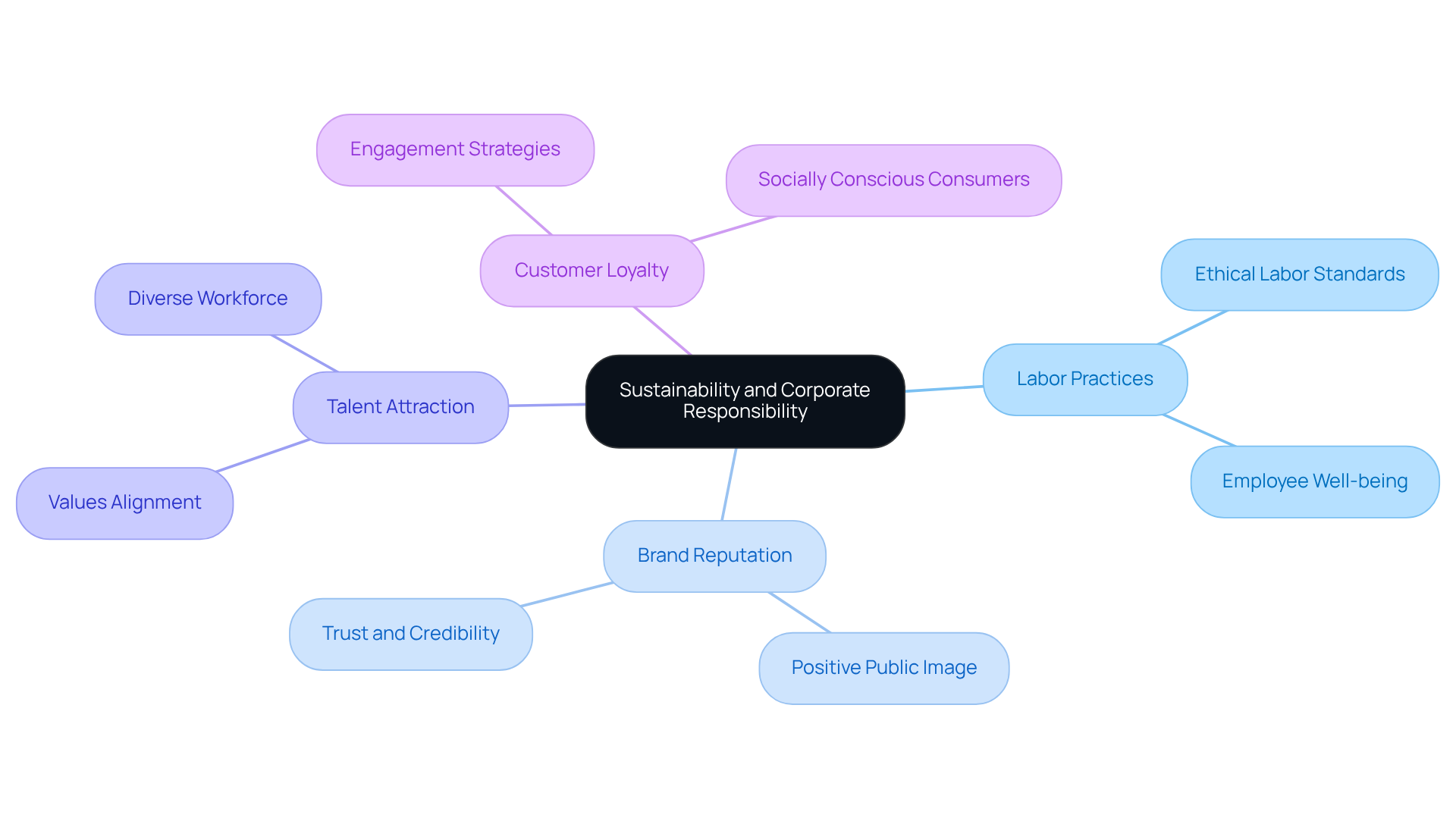
Technology-Driven Engagement: Boosting Productivity in Startups
Technology-driven engagement strategies are crucial for enhancing productivity in new ventures. By leveraging tools that facilitate communication, collaboration, and feedback, startups can cultivate an environment where staff feel valued and engaged. Companies prioritizing virtual collaboration tools have reported a remarkable 25% increase in employee engagement and a 15% reduction in turnover rates, underscoring the effectiveness of these solutions.
Sales managers must explore technology solutions that enhance engagement, such as project management software like Slack and Microsoft Teams, alongside communication platforms like Zoom, to ensure their teams remain connected and motivated. Research reveals that groups utilizing virtual communication tools experience a staggering 41% rise in productivity compared to traditional in-person teams.
As McKinsey & Company asserts, "companies that effectively leverage virtual communication tools experience a 20% increase in productivity among remote workers." This emphasis on engagement can significantly improve performance and foster a robust organizational culture.
To implement these strategies effectively, sales leaders should:
- Conduct regular training sessions on these tools.
- Encourage team members to share feedback on their usage.
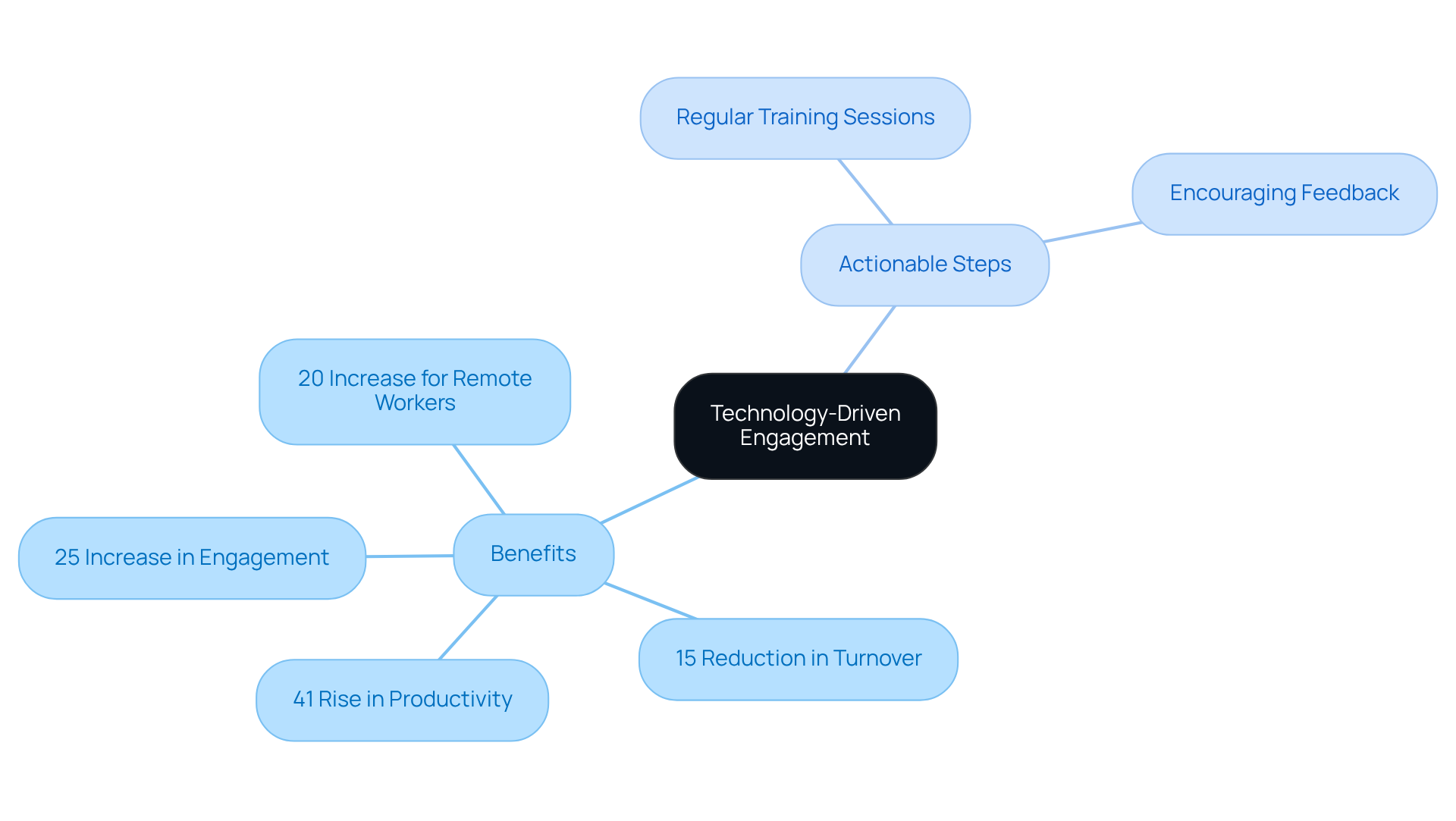
Conclusion
The landscape of startup labor is evolving rapidly, driven by innovations and shifting societal expectations. As sales leaders prepare for 2025, understanding these emerging trends is crucial. From AI-powered recruitment tools to the integration of flexible work arrangements, the insights shared in this article highlight the necessity for startups to adapt and thrive in a competitive environment.
Key trends such as:
- Remote work
- Diversity and inclusion
- The gig economy
are reshaping how startups approach talent acquisition and employee engagement. The emphasis on employee well-being, continuous learning, and sustainability further underscores the importance of creating a supportive and innovative workplace culture. By embracing these trends, startups not only enhance their operational efficiency but also position themselves as attractive employers in the eyes of top talent.
As the labor market continues to transform, it is imperative for startup leaders to actively implement strategies that align with these trends. Fostering an inclusive, flexible, and technologically advanced workplace will not only drive productivity but also create a resilient workforce ready to tackle future challenges. The time to act is now—embrace these insights and lead your startup toward a successful and sustainable future.
Frequently Asked Questions
What is Websets and how does it optimize recruitment for startups?
Websets is an AI-powered platform that revolutionizes the recruitment process for emerging companies by using advanced algorithms to filter vast datasets. It helps companies quickly identify and connect with qualified candidates, enriching search results with insights like LinkedIn profiles and prior work experiences, enabling informed hiring decisions.
How does AI adoption impact hiring forecast precision?
Following the adoption of AI, 67% of organizations report enhanced precision in their hiring forecasts, making the recruitment process more efficient for emerging companies.
What are the benefits of remote work for startups?
Remote work allows startups to access a global talent pool, enhancing diversity and fostering innovation. This broader hiring landscape attracts varied perspectives, leading to more creative solutions and improved problem-solving capabilities.
What challenges do startups face with remote work?
Startups face challenges in maintaining team cohesion and ensuring effective communication across dispersed teams, particularly in adapting to the evolving labor dynamics.
What strategies can sales executives use to overcome remote work challenges?
Sales executives can utilize precision-driven B2B lead generation and recruitment solutions, leverage advanced AI-driven strategies to identify unique candidate qualities, and cultivate a remote-friendly culture that emphasizes collaboration, productivity, and clear expectations.
Why are diversity and inclusion important in startup hiring?
Diversity and inclusion are crucial as they foster a dynamic workplace culture and significantly enhance innovation and creativity. Diverse teams excel in problem-solving and decision-making, leading to better outcomes and improved financial success.
What inclusive hiring practices should sales leaders implement?
Sales leaders should implement practices such as blind recruitment and diverse interview panels to attract a wide range of candidates, mitigate unconscious bias, and ensure every voice is valued.
How does prioritizing diversity impact a startup's ability to attract talent?
Prioritizing diversity significantly enhances an organization's ability to attract top talent, as 76% of job seekers consider a diverse workforce a crucial factor when evaluating companies.




